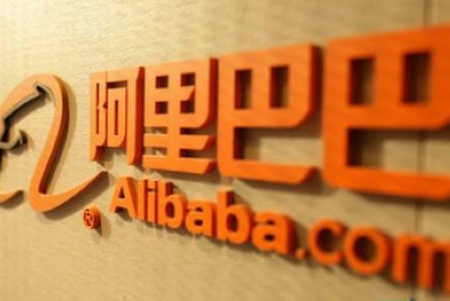On Friday morning, Jack Ma,the charismatic and already super-wealthy founder of Alibaba Group, isexpected to ring the bell of the New YorkStock Exchange. It will mark the much-anticipated debut of shares of the Chinese company, and could become theworld's largest initial public offering ever.Here are some key points you should know about the people leading thise-commerce giant:
周五早上,马云---这位极富魅力且超级富有的阿里巴巴集团的创始人,将在万众期待下,敲响纽约证券交易所的开市铃。这将标志着这家中国公司备受期许的股票首秀的上演,同时它也可能成为迄今为止规模最大的IPO。以下是一些你应该知晓的要点,可以帮助你了解这家电子商务巨头的领导者们。

1.Jack Mais not actually the CEO.
事实上,马云并不是CEO
The name behind this massivestock offering may be the founder and the company's face — and a very visible one at that — but he's nottechnically the CEO. Ma stepped down as chief executive in January 2013, and a few months laterJonathan Lu took the CEO title.
这次大规模募股背后的名字或许是阿里的创始人和这间公司的招牌人物,也就是最引人瞩目的那个,但严格说来,马云并不是CEO。马云在2013年的一月就已经从首席执行官的位置上退下来了,数月后陆兆禧便继任了CEO一职。
Lu, whose first job after college was at the receptiondesk of a Holiday Inn in China, has been described as Ma's "corporatealter-ego." He's a sort of Tim Cook to Jack Ma's Steve Jobs — thesoft-spoken, behind-the-scenes operator who focuses on the company's current needs while Ma, now executive chairman, is the visionary. Still, as arecent New York Times profile reminded us, Ma continuesto act not only as the public face but as the chiefnegotiator, the top strategist and the biggest individual shareholderwho remains very much in control.
陆兆禧,他大学毕业后的第一份工作是在中国的一家假日酒店当前台,他曾被形容为马云的“商业上的知己”,他之于马云就如库克之于乔布斯一样。这位语调轻柔的幕后经营者关注的是公司现时的需要,而马云,也就是现在的执行主席,则是那个有长远目光的人。然而,正如近期纽约时报的一份简介所告诉我们的,马云在继续扮演公众人物的同时,还担任阿里的首席谈判代表、最高战略制定者和最大的个体持股人。
Another behind-the-scenes person of note: Simon Xie, a co-founder and vice president, is the only person besides Ma who owns the "variable-interest entities" that hold the operating licenses tovarious Web sites that are critical to Alibaba's business. Accordingto Reuters,the unassuming Xie helps run Alibaba's investment division and is not a memberof the 30-person steering committee that manages the company (see below), buthe is still "one of Ma's most trusted business partners."
另一个重要的幕后人物就是谢世煌,阿里的合伙创始人之一兼公司副总。他是除马云外唯一一个拥有“可变利益实体”的人,这些“可变利益实体”掌握着对阿里的生意至关重要的众多网站的经营权。根据路透社的报道,低调的谢世煌帮助经营阿里巴巴的投资部门,但不属于管理公司的30人指导委员会的成员,但他仍是马云最为信赖的商业伙伴之一。
2. Its governance structureis novel, and possibly unprecedented, for a company of this size.
阿里的管理结构很新奇,对于这么大的公司来说,可能是前所未有的。
Alibaba Group has an unorthodox approachto governing itself. In filings,it writes that the company has acted like a partnership in many ways since its founders first got together in Jack Ma's apartment in 1999. As aresult, in 2010 it established the "Alibaba Partnership," a now 30-member steering committee made up of managers at Alibaba Group andrelated companies. Alibaba says this arrangement allows executives to focus on the long-term, collaborate better and "override bureaucracy andhierarchy."
阿里集团有着非传统的经营方式,根据归档记录,自从1999年它的发起人们在马云的公寓第一次聚会开始,阿里巴巴在很多方面都一直像是个合伙企业。最为结果,在2010年“阿里巴巴合伙人”成立了,它是一个拥有30名成员的指导委员会,它的成员包括阿里集团和其他相关公司的高管。阿里巴巴声称这种安排能让管理者把眼光放得更长远,更好地合作并且可以不受官僚主义和等级制的制约。
In filings, the company also noted it sees this as a better alternative todual-class share structures, which have been used in other tech giants. In those, votes by shareholders (often founders) who own acertain class of stock carry a disproportionate weight. Alibaba has argued its structure "is designed to embody the vision of a large group of managementpartners. This structure is our solution for preserving the culture shaped byour founders while at the same time accounting for the fact that founders will inevitably retire from the company."
这家公司还特别提到,它把这种经营方式视为一种“双重持股结构”的更优替代品,虽然其他的科技业巨头都已经采用了“双重持股结构”。在这样的结构下,一个拥有特定比例股权的持股人(通常是创始人),他们的决策与选择往往有着不成比例的分量。阿里巴巴则说它自己的结构是为了“体现大型合伙集团的想法。这种结构可以保留由发起人塑造的企业文化,毕竟这些发起人终有一天会退休。”
Yet while those Alibaba managers in the partnership don't have outsized votes, they do have a very special privilege: They get to nominate a majority of the company's governing body, its board of directors.
虽然这些阿里巴巴的合伙人没有超额的投票权,但他们确实有一种特权:那就是,他们可以提名公司管理部门的大多数席位,也就是他们的董事会。
That means, in effect, they have the power to choose whom they answer to. "You're basicallyceding control to management," says Charles Elson, the director of the John L. Weinberg Center for Corporate Governanceat the University of Delaware. "It's very unusual. I've never seen anything like it for a company of this size."
说白了,他们有选择他们要对谁负责的权力。“你基本上放弃了对管理的控制”查理斯·埃尔斯,特拉华大学约翰·L·维恩伯格企业管理中心的主任说道“这非同寻常,我从来没见过这么大的公司弄这种东西。”
3. That — plus Ma's comment that "shareholders comethird" — could be a concern for some investors.
马云说“股东只排第三”。对于投资者来说,这值得关注。
Sinceinsiders have so much control over the board, some governance experts wonderwhat that means for the board's independence and efficacy. Harvard Law School's Lucian Bebchuk, for example, detailed his concerns in a recent NewYork Times piece.While that risk doesn't seem to be keeping many people away from the huge stock offering, some investors have called it out as a warning sign.
因为内部人士强有力地控制了董事会,所以一些企业管理的专家想要弄清对于董事会的独立性和功用而言,这(阿里的这种特殊的结构)意味着什么。比如,哈佛法学院的卢锡安·贝恰克就在近期纽约时报撰文详列了他关注的重点。虽然这种风险没能阻止人们对阿里股票的追捧,但一些投资人已经将其视作危险的信号。
Less worrisome is the comment in Ma's letter to shareholders that Alibaba "willput 'customers first, employees second, and shareholders third.'” Plentyof other business leaders haveused similar phrasing,and what he appears to mean is that he intends to focus on the long termrather than give in to short-term whims of shareholders that might arise. Without offering something that's first and foremost valuable to customers, and ensuring the company has happy, talented and focusedemployees to support that work, "we could not possibly have satisfied shareholders," Ma writes.
相对不那么让人担心的是马云在给股东们的公开信中所表述的“阿里巴巴会把消费者放在第一位,员工第二,股东第三”。其他很多的商业领袖也会使用类似的措辞,而且似乎马云的言外之意是他想要注重长远利益而不是给未来的股东们短期的小惠。没有要给顾客有价值的商品和服务,也没有保证公司拥有待遇满意、有才干、目标明确的雇员来完成那样的工作,马云只是简单(在信中)说道:“我们可能无法让股东满意。”
4. The gender diversity of its management team is better than that ofsome big companies in Silicon Valley. But on the board,it's lacking.
阿里巴巴管理团队的性别多样化程度要高于硅谷的一些大公司;但在董事会,却性别单一。
Nine of the 30 members of the AlibabaPartnership, or nearly 30 percent, are women. And three of the 12 executives itlists on its Web site as leaders of the companyare as well. That's higher thanthe 21 percent of Google's leaders who are women and the21 percent at Twitter. (The28 percent at eBay and Apple are more in line.) AlibabaGroup's chief financial officer, head of human resources, and "chief customer officer" are all women.
阿里巴巴30位合伙人中有9位是女性,也就是30%的比例。另外,在阿里网站公布的其公司领导名单中,12位执行官有3位也是女性,这高于只有21%的谷歌女性领导比例,也高于同样只有21%的推特(Ebay是28%,苹果也差不多)。阿里集团的首席财政官、人力资源总监、首席客户服务官都是女人。
Yet the gender makeup of its boardleaves something to be desired. The lone female on the nine-member board is Yahoo's chief development officer, Jacqueline Reses — and she is expected to step down once the IPO is completed.
然而,阿里董事会的性别构成却还有待改进。9位董事中只有一位女性杰奎琳·雷瑟斯,她是雅虎的首席发展官,但当阿里的IPO完成,她就会从董事的位置上退下来。
5. The annual shareholder letter won't always come fromMa, or the CEO.
阿里巴巴的年度股东信并不总是来自马云,或者是其CEO
That may sound like a trivial thing, butit's not. Annual shareholder letters from big-namecompanies, such as Warren Buffett's at Berkshire Hath away or the one written by Amazon's Jeff Bezos (who also owns the Washingt on Post), are widely studied byinvestors. They offer shareholders a sense of the big-picture strategy,some insights on how management thinks, and the key priorities for the company.Yet Ma has written that, after the IPO, his "partners in the Alibaba Partnership will take turns writing the annual letter." That's a veryunusual practice — just like plenty of other things about this huge companythat's about to go public.
这最后一点听起来有点微不足道,但事实并不是这样。 知名公司的年度股东信,比如伯克希尔·哈撒韦公司的沃伦巴菲特或者是亚马逊的杰夫·贝佐斯(他还收购了华生顿邮报)所写的年度股东信都被投资者广泛地研究。这些股东信给股东以大战略的愿景、一些对公司管理的见解以及公司的当务之急。马云写了这第一封,但在IPO之后,将有他的阿里合伙人们轮流来写年度股东信。这是一种不寻常的做法————就像这家即将上市的大公司的很多其他新鲜事一样。













